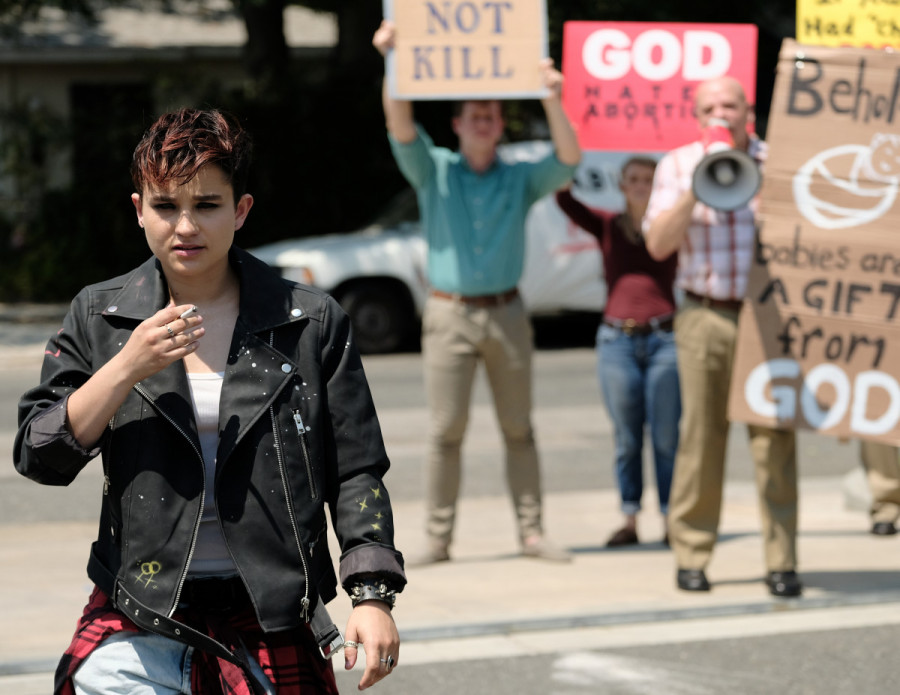Montreal Feminist Film Festival Fulfills a Need
Queer Narratives, Motherhood, Ageism, and More, 31 Feminist Movies Premiered
“There’s a lot of women who have penetrated very masculine sectors, but the contrary is less,” explained film director Martine Asselin.
Her film, entitled Un Homme Sage-Femme, (translating as Midwife Man in English), chronicles the story of Louis Maltais, the first man to be enrolled in Université du Québec à Trois-Rivières’ midwifery bachelor program.
The film was one of four features to screen at this year’s Montreal’s Feminist Film Festival.
“It’s a feminist film, right?” Asselin said in French on stage following the screening on Sept. 21, “even if it’s a man.”
Montreal FFF founder Magenta Baribeau agreed.
“It’s about the struggles of a man in a female work environment, and it totally mirrors the struggles of women in a male-dominated work space,” said Baribeau. “Basically, there are two facets of patriarchy, and it’s definitely feminist because of that, even though the character is a cis white man.”
“It’s still completely feminist because you have to think about it in terms of breaking the patterns of patriarchy and oppression,” she added.
Run between Sept. 18 and 22, the festival brought together the works of local and international filmmakers for five nights of inspiring films meant to empower.
The Montreal FFF is intersectional and anti-oppressive. Films cover a wide range of topics and themes, tackling the issues related to a lack of female representation in the media, queer people, People of Colour, and “all the struggles that all these groups of women face,” explained Baribeau.
Each night was crafted to fit a theme. The themes included queer, trans, and lesbian feminism night, another evening of genre films and one depicting motherhood in all its forms. Of the 36 films that were screened, 31 were premieres.
“We’ve been growing every year,” said Baribeau. “The first year was four nights, second year was eight days.”
With a festival run entirely by volunteers, Baribeau herself included, five days is plenty.
“When I see that there is a need for something, then I will just make it happen.” — Magenta Baribeau
As a filmmaker herself, Baribeau travelled to the London FFF in 2016, and the following year to Berlins’ version of the festival.
“Going to those festivals was just absolutely amazing,” she said. “I wondered why [Montreal] didn’t have our own.”
“When I see that there is a need for something, then I will just make it happen,” she continued. “So I just, within a few months, was like, ‘OK, let’s do it.’”
The fall of 2017 marked the festival’s first incarnation. Baribeau called that first year a trial run. Funding the whole festival herself, she had no idea if anybody would attend, much less garner the same feelings from audience members she had felt in the European festivals.
That first year was a success; all the screenings were sold out. The same happened with the festivals second incarnation.
This year, Baribeau decided to sell tickets in advance. Again, many of the screenings were sold out.
Though selling out means that the festival is successful, for Baribeau the problem is in a lack of funding and accessible space. Right now, Montreal Feminst Film Fest is an official not-for-profit, relying on inexpensive or free venues, like the Association des réalisateurs et réalisatrices du Québec, where some of the screenings were held.
So far, the organization has not received any grants, relying on each incarnation to fund the next.
Feminist films are difficult to fund and even harder to distribute. Often, general interest film festivals don’t want to break their status quo and take a chance screening feminist films. Screening the films at an official FFF can be the only way that these films are screened, explained Baribeau.
The festival employs a pay-what-you-can approach to ticket-selling, speaking to Baribeau’s intention to keep the festival “do-it-yourself, a little punk, [and] a little anti-capitalist.”
The films of the festival are distinct, tying the overarching feminist theme in very different ways. With no two films alike, many perspectives were shared.
In the programming, Baribeau staggered darker films with more lighthearted ones, to “balance things out,’‘ she explained.
The five-minute short film “Tampon,” by Erica Orofino, told the tale of a young woman searching in desperation for a place to hide her used tampon in the home of her lover. It was humorous, witty, and all too relatable.
A 12-minute film set during the 1990s reproductive rights struggle in the U.S., “The Line” by Melisa Resch is a coming-of-age love story “set against the backdrop of protest”, reads the blurb on Montreal FFF’s website.
“We want people to enjoy their time with us,” said FFF volunteer Anne-Julie Lalande. “We don’t want to show films that, when people leave, they’re like sad, or they’re like, there’s nothing to do about that issue.”
“We want it to be empowering and fun, and we love when people respond that way,” she added.



